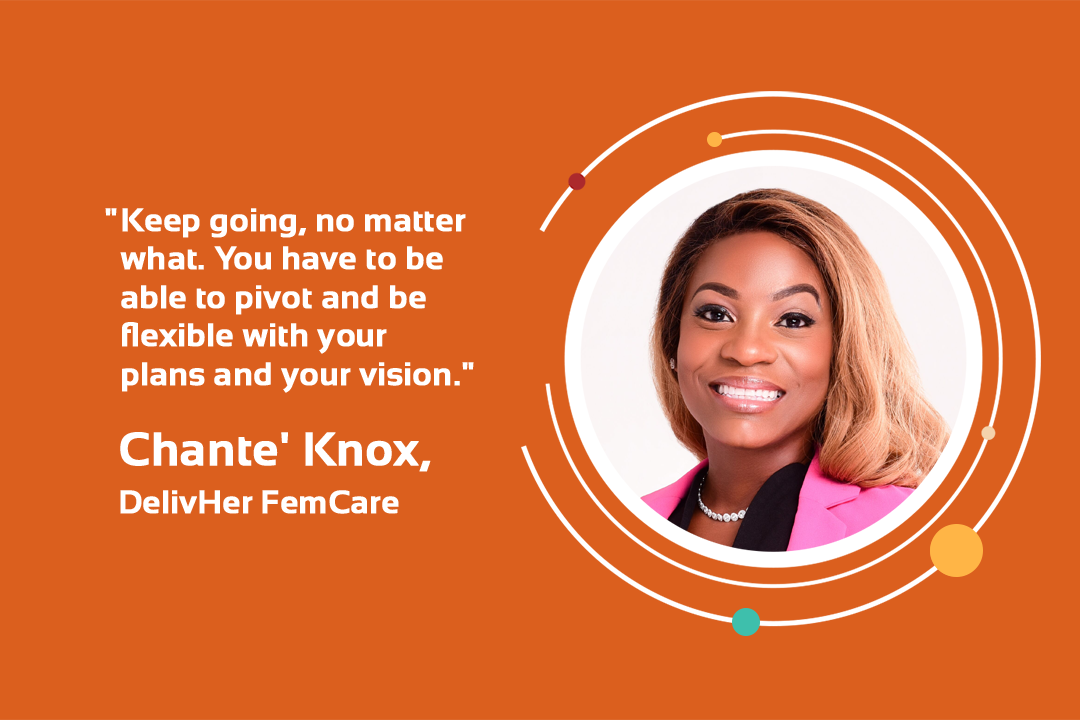
An innovator’s journey from idea to market can be challenging and complicated—but also rewarding. Each month we explore how inventor-entrepreneurs in our network have evolved since they started their journey. Our goal is to share key learnings and best practices with early-stage science and technology inventors embarking on a path of innovation and entrepreneurship. Our latest spotlight is with Chante’ Knox, founder of E-Team, DelivHer FemCare. Menstrual products like tampons and pads are designed for peak absorption and alternatives like menstrual cups are designed for peak collection but there aren’t options available that wed the two. Inspired by her own journey seeking quality menstrual care, Knox created the Anu Clean Cup, a disposable menstrual cup with an absorbent liner that is comfortable, safe, and longer-lasting than traditional menstrual care products.
what challenge did you seek to solve with your innovation and why?
Initially, the product was created basically out of sheer necessity for myself—I didn’t like tampons or pads, and I used to have a really heavy flow. I would go through a super plus tampon in two hours, so when my cycle came around, I had to make sure I scheduled my outings around restroom facilities. A friend introduced me to disposable menstrual cups and I absolutely loved them but I knew I had to figure out a way to make them better. I knew if they could also absorb, it would be the perfect barrier protection. I found that all of the available options centered either on collection capacity or absorbent quality, but nobody thought to combine collection capacity and absorbent quality.
what have you learned along your innovation and entrepreneurship journey?
Keep going, no matter what. Begin with the end in mind and keep your focus on your goal. Even if you create a plan, things are definitely going to change. You have to be able to pivot and be flexible with your plans and your vision.
tell us how you’ve integrated environmentally-responsible practices into your innovation or process?
In our manufacturing process, we use less materials than sanitary napkins and tampons. Our cup lasts 12 hours instead of two to eight hours like other menstrual products so that also helps reduce the impact of menstrual product waste. We’re also looking to work with different, biodegradable materials that are safe and compatible with the body.
how has support from VentureWell impacted your innovation and venture?
VentureWell has had a tremendous impact on how quickly we’re progressing. The funding allowed us to complete our prototype, and the mentoring covered everything from intellectual property to KPI’s. Support from VentureWell is like receiving a mini MBA. The knowledge gained and assistance from mentors is priceless.
what’s next for you?
We were planning on conducting focus groups at Morehouse College and Spelman University but when the pandemic hit, we had to pivot. Instead, we applied for a grant from the National Science Foundation, and they require proof that the product is commercially viable. We have to make sure that we can manufacture the cups in a way that’s going to allow us to scale and commercialize. Clinical trials aren’t required because the FDA exempted menstrual cups in 2015 but we’re still planning to do limited testing out of an abundance of caution and care, to make sure our products are safe and that they work the way we intend.
The E-Team Grant program supports dedicated science- and engineering-based student teams from across the nation in bringing their high-impact innovation out of the lab and into the market.
What does it take to get from idea to impact? Our new case study offers a deep dive into one innovator’s entrepreneurship journey, highlighting the nuanced experience, lessons learned, and major development milestones.